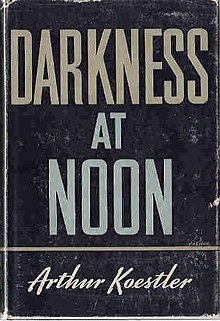Darkness at Noon

First US edition
|
|
| Author | Arthur Koestler |
|---|---|
| Original title | Sonnenfinsternis |
| Country | United Kingdom |
| Language | German/English |
| Publisher | Macmillan |
|
Publication date
|
1940 |
|
Published in English
|
1940 |
| Pages | 254 pp (Danube edition) |
| OCLC | 21947763 |
| Preceded by | The Gladiators |
| Followed by | Arrival and Departure |
Darkness at Noon (German: Sonnenfinsternis) is a novel by Hungarian-born British novelist Arthur Koestler, first published in 1940. His best known work, it is the tale of Rubashov, an Old Bolshevik who is arrested, imprisoned, and tried for treason against the government that he had helped to create.
The novel is set in 1938 during the Stalinist Great Purge and Moscow show trials. Despite being based on real events, the novel does not name either Russia or the USSR, and tends to use generic terms to describe people and organizations: for example the Soviet government is referred to as "the Party" and Nazi Germany is referred to as "the Dictatorship". Joseph Stalin is represented by "Number One", a menacing dictator. The novel expresses the author's disillusionment with the Soviet Union's version of Communism at the outset of World War II.
In 1998, the Modern Library ranked Darkness at Noon number eight on its list of the 100 best English-language novels of the 20th century.
Koestler wrote Darkness at Noon as the second part of a trilogy: the first volume was The Gladiators (1939), first published in Hungarian. It was a novel about the subversion of the Spartacus revolt. The third novel was Arrival and Departure (1943), about a refugee during World War II. Koestler, who was by then living in London, wrote that novel in English.
Darkness at Noon was written in German while Koestler was living in Paris. His companion, the sculptor Daphne Hardy, translated it into English during early 1940 while she was living in Paris with him. For decades the German text was thought to have been lost during the escape of Koestler and Hardy from Paris in May 1940, just before the German occupation of France. However, a copy had been sent to Swiss publisher Emil Oprecht. Rupert Hart-Davis, Koestler's editor at Jonathan Cape had misgivings about the English text but agreed to publish it when a request to Oprecht for his copy went unanswered. At Hart-Davis' prompting, Hardy changed the title from Rubaschow (the main character's name) to Darkness at Noon. In August 2015, Oprecht's copy was identified in a Zurich library by a doctoral candidate of the University of Kassel.
...
Wikipedia
